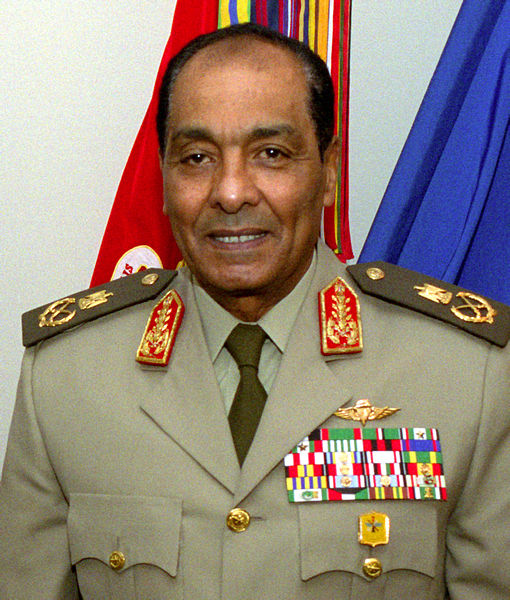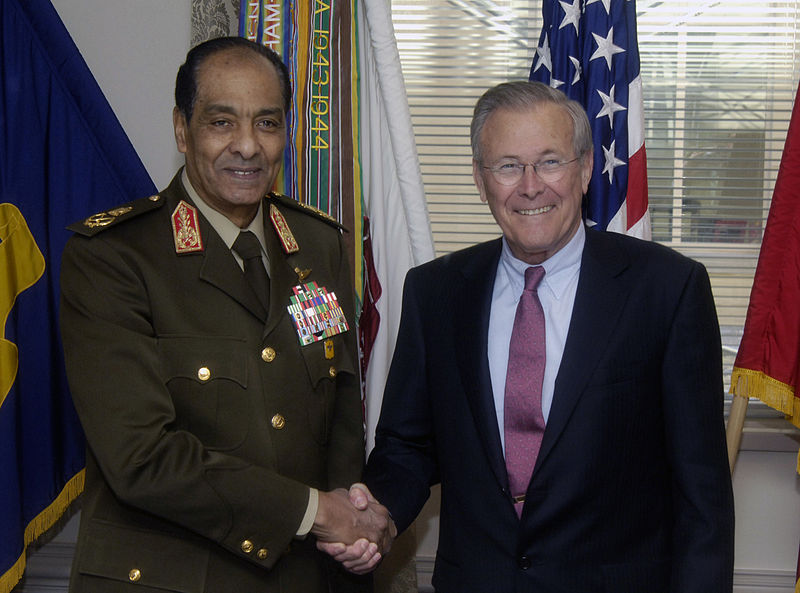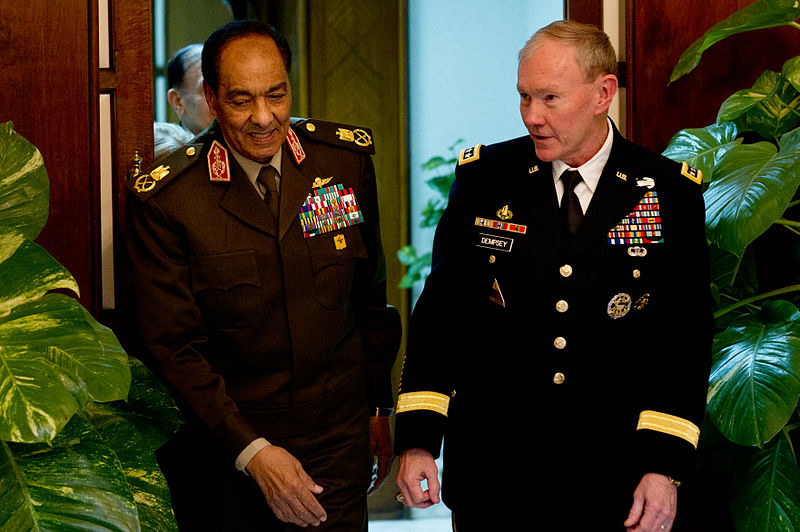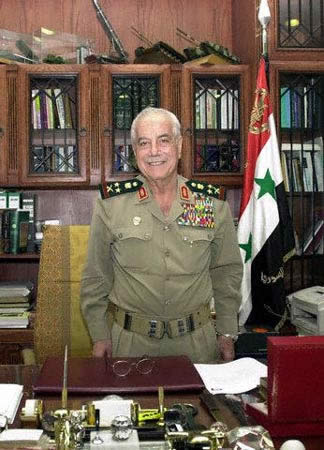<Back to Index>
- Commander - in - Chief of the Egyptian Armed Forces Field Marshal Mohamed Hussein Tantawi Soliman, 1935
- Minister of Defense Mustafa Abdul Qadir Tlass, 1932
PAGE SPONSOR

Field Marshal Mohamed Hussein Tantawi Soliman (Arabic: محمد حسين طنطاوى سليمان ; October 31, 1935 - September 21, 2021) was an Egyptian Field Marshal and former statesman. He was the commander - in - chief of the Egyptian Armed Forces and, as Chairman of the Supreme Council of the Armed Forces, was the de facto head of state from the ouster of Hosni Mubarak on February 11, 2011, to the inauguration of Mohamed Morsi as President of Egypt on June 30, 2012. Tantawi served in the government as Minister of Defense and Military Production from 1991 until Morsi declared Tantawi had retired on August 12, 2012.
Tantawi, who is of Nubian origin, received his commission as a military officer on April 1, 1956 serving in the infantry. Later that year he took part in the Suez War (or the Tripartite Aggression as it is often known in Egypt). Later in his career he was involved in the Six Day War of 1967, the War of Attrition of 1967 – 1970, and the October or Yom Kippur War of 1973. He held various command and staff appointments including both the Chief of Staff and then Commander of the Egyptian Second Army. Additionally he has served as the military attaché to Pakistan, an important role given the two countries' political and military links. Tantawi has served as Commander of the Republican Guard, and Chief of the Operations Authority of the Armed Forces. In 1991, he also commanded an Egyptian Army unit in the U.S. led Gulf War against Iraq to force Iraq to withdraw from Kuwait, which it invaded in 1990.
On May 20, 1991, following the dismissal of Lt. General Youssef Sabri Abu Taleb, Tantawi was appointed as Minister of Defense and Military Production and commander - in - chief of the Egyptian Armed Forces. He was also appointed as Field Marshal. It is believed that Tantawi would have succeeded Mubarak as president of Egypt, had the assassination attempt in June 1995 been successful. Early in 2011, Tantawi was seen as a possible contender for the Egyptian presidency.
On February 11, 2011 when President Hosni Mubarak resigned, after 18 days of protests from the Egyptian people, he transferred authority to the Supreme Council of the Armed Forces, headed by Tantawi. The council, overseeing issues with the Chairman of the Supreme Constitutional Court, Farouk Sultan, dissolved the Egyptian parliament, oversaw the referendum over temporary constitutional amendments that took place on March 19, and presided over Mubarak's and many of the former regime's top figures summons to justice.
On a personal level, Tantawi had kept a relatively low profile since the handing over of power to the Council, only making a first public appearance in an address to mark the graduation of a batch at the Police Academy on 16 May 2011. He opted to leave most public speeches and press releases to other senior members in the council, he also appointed Prime Minister Essam Sharaf and his cabinet. Tantawi also received a number of foreign officials, including British Prime Minister David Cameron and U.S. Secretary of State Hillary Clinton.
After a new series of protests in November 2011, that escalated by 22 November to over 33 dead and over 2,000 injured in the wake of the use of force by the police to quell protests at Tahrir Square and its vicinity, Tantawi appeared on Egyptian national television to pledge the speeding up of presidential elections – the principal demand of protesters – and that the armed forces "are fully prepared to immediately hand over power and to return to their original duty in protecting the homeland if that's what the people want, through a popular referendum if necessary."
On August 12, 2012, Egypt's president Mohamed Morsi ordered Tantawi to retire as head of the armed forces and defense minister. Tantawi was decorated with the Order of the Nile and appointed, instead, as an advisor to Morsi; there was speculation that his removal was part of a pre-arranged withdrawal by the military from political power in exchange for immunity from prosecution for earlier actions.
Criticism of Tantawi in Egypt has been manyfold, including many chants in Tahrir for him to leave. Chants against Tantawi have included "Tantawi stripped your women naked, come join us." According to The Telegraph, protesters have also "demanded the execution of Tantawi."
Nabeel Rajab, the head of Bahrain Center for Human Rights, criticized Tantawi for his reception of the king of Bahrain, Hamad bin Isa Al Khalifa in October 2011. "This is a very bad message from the Supreme Council of the Armed Forces to the international community, the Egyptian and Bahraini people", he said. "Continuing this path threatens Egypt's democratic future", he added, sadly so prophetically.



Mustafa Abdul Qadir Tlass (Arabic: مصطفى طلاس; 11 May 1932 - 27 June 2017) was a Syrian politician who was Syria's Minister of Defense from 1972 to 2002.
Tlass was born in Rastan, near the city of Homs, to a prominent Sunni Muslim family on 11 May 1932. His father, Abdul Qadir Tlass, was a minor Sunni notable who made a living during the Ottoman period by selling ammunition to the Turkish garrisons. On the other hand, the members of his family also worked for the French occupiers after the First World War. Mustafa Tlass is said to have some Alawite family connections through his mother. He received primary and secondary education in Homs. In 1952, he entered the Homs Military Academy.
Tlass joined the Ba'ath Party at the age of 15, and met Hafez al-Assad when studying at the military academy in Homs. The two officers became friends when they were both stationed in Cairo during the period of 1958 - 1961 United Arab Republic merger between Syria and Egypt: while ardent Pan Arab nationalists, they both worked to break up the union, which they viewed as unfairly balanced in Egypt's favor. When Hafez al-Assad was briefly imprisoned by Nasser at the breakup of the union, Tlass fled and rescued his wife and sons to Syria.
During the 1960s, Hafez al-Assad rose to prominence in the Syrian government through a 1963 coup d'état, backed by the Ba'ath party. He then promoted Tlass to high ranking military and party positions. In 1965, while he was Ba'athist army commander of Homs, Lieutenant Colonel Mustafa Tlass arrested his pro-regime comrades. A 1966 coup by an Alawite dominated Ba'ath faction further strengthened al-Assad, and by association Tlass. Tensions within the government soon became apparent, however, with al-Assad emerging as the prime proponent of a pragmatist, military based faction opposed to the ideological radicalism of the dominant ultra leftists. Syrian defeat in the 1967 Six Day War embarrassed the government, and in 1968 al-Assad managed to install Tlass as new Chief - of - Staff. After the debacle of an attempted Syrian intervention in the Black September conflict, the power struggle came to open conflict.
In 1969, Tlass led a military mission to Beijing, and secured weapons deals with the Chinese government. In a move deliberately calculated to antagonize the Soviet Union to stay out of the succession dispute then going on in Syria, Mustafa Tlass allowed himself to be photographed waving Mao Zedong's Little Red Book, just two months after bloody clashes between Chinese and Soviet armies on the Ussuri river. The Soviet Union then agreed to back down and sell Syria weapons.
Under cover of the 1970 "Corrective Revolution", Hafez al-Assad seized power and installed himself as President. Tlass was promoted to Minister of Defense in 1972, and became one of al-Assad's most trusted loyalists during the following 30 years of one man rule in Syria. As'ad Abu Khalil argues that Mustafa Tlass was well suited for Hafez al-Assad as a Defense Minister in that "he had no power base, he was mediocre, and he had no political skills, and his loyalty to his boss was complete." During his term as defense minister, Mustafa Tlass was functional in suppressing all dissent originating by both Islamists and democrats.
Tlass attempted to create a reputation for himself as a man of culture, and emerged as an important patron of Syrian literature. He published several books of his own, and started a publishing house, Tlass Books, which has been internationally criticized for publishing anti - Semitic materials.
In 1998, Syrian Defense Minister Mustafa Tlass boasted to al Bayan newspaper that he was the one who gave the green light to "the resistance" in Lebanon to attack and kill 241 U.S. marines and 58 French paratroopers, but that he prevented attacks on the Italian soldiers of the multi - national force "because he was in love with the Italian actress Gina Lollobrigida." It is ironic that France gave him refuge along with his family.
Mustafa Tlass had also boasted to the National Assembly about atrocities committed against Israelis who fell captive in the Yom Kippur war. "I gave the Medal of the Republic's Hero, to a soldier from Aleppo, who killed 28 Jewish soldiers. He did not use the military weapon to kill them but utilized the ax to decapitate them. He then devoured the neck of one of them and ate it in front of the people. I am proud of his courage and bravery, for he actually killed by himself 28 Jews by count and cash."
There are three missing Israeli soldiers in the Bekaa valley since the June 1982 war in Lebanon. Tlass allegedly told a Saudi magazine: "We sent Israel the bones of dogs, and Israel may protest as much as it likes."
During his career, Tlass also became known for colorful language. In 1991, when Syria was participating on the Coalition side in the Gulf War, Tlass stated that he felt "an overwhelming joy" when Saddam Hussein sent SCUD missiles towards Israel. In 1999, Tlass caused a minor uproar in Arab political circles, when he denounced Palestinian leader Yassir Arafat as "the son of sixty thousand dogs and sixty thousand whores". Earlier, in 1986, he had called Arafat an "idiot" and a "puppet of the Americans". The long standing conflict between the Assad regime and the Palestine Liberation Organization would not end until after Hafez al-Assad's death in 2000.
In 2000, the widow and children of Ira Weinstein who was killed in a February 1996 Hamas suicide bombing, filed a lawsuit against Tlass and the head of Syrian military intelligence in Lebanon, Ghazi Kanaan, charging that they were responsible for providing the perpetrators with material resources and training.
In an interview which aired Russia Today TV on 8 June 2009 (as translated by MEMRI), Tlass claimed that actress Gina Lollobrigida had once told him that he was the "one love in my life." He also claimed that Lady Diana wrote him letters that "were full of love and appreciation." He also claimed that Prince Charles has given him a submachine gun as a gift.
Tlass opened a publishing house in Damascus and was the first person to try to uncover pre-Ba'ath Syria in an objective manner.
Tlass also wrote books about Syria’s military and political history and also books of poetry, general Arab history, and a history of the military tactics used by Prophet Muhammad. His writings reflect anti - Semitism and belief in conspiracy theories. He also published a two - volume memoirs, namely Mirat Hayati (Reflections of my life) in 2005.
In 1983, Tlass wrote and published The Matzah of Zion, which is a treatment of the Damascus affair of 1840 that repeats the ancient "blood libel", that Jews use the blood of murdered non - Jews in religious rituals such as baking Matza bread. In this book, he argues that that the true religious beliefs of Jews are "black hatred against all humans and religions," and that no Arab country should ever sign a peace treaty with Israel. Tlass re-printed the book several times, and stands by its conclusions. Following the book's publication, Tlass told Der Spiegel, that this accusation against Jews was valid and that his book is "an historical study ... based on documents from France, Vienna and the American University in Beirut."
Regarding the book, Tlass has stated that "I intend through publication of this book to throw light on some secrets of the Jewish religion based on the conduct of the Jews and their fanaticism" and that both Eastern and Western civilizations threw Jews into ghettos only after recognizing their "destructive badness". He also claimed that since 1840, "...every mother warned her child: Do not stray far from home. The Jew may come by and put you in his sack to kill you and suck your blood for the Matzah of Zion."
In 1991 The Matzah of Zion was translated into English. Egyptian producer Munir Radhi subsequently decided it was the ideal "Arab answer" to the film Schindler's List and later announced plans to produce a film adaptation of The Matzah of Zion. The book also reportedly served as a "scientific" basis for a renewal of the blood libel charge in international forums. In 2001, Al Ahram published an article titled "A Jewish Matzah Made from Arab Blood" which summarized The Matzah of Zion, concluding that: "The bestial drive to knead Passover matzahs with the blood of non - Jews is [confirmed] in the records of the Palestinian police where there are many recorded cases of the bodies of Arab children who had disappeared being found, torn to pieces without a single drop of blood. The most reasonable explanation is that the blood was taken to be kneaded into the dough of extremist Jews to be used in matzahs to be devoured during Passover."
The succession of Bashar al-Assad, Hafez's son, seems to have been secured by Tlass (for a while, it was rumored that Tlass himself had assumed the Presidency, but this was not true), and his influence increased sharply as he came to head the "old guard" within the regime, sometimes at odds with the inexperienced young President. Whether true or not, Tlass and his supporters were viewed by many as opponents of the discreet liberalization pursued by the younger al-Assad, and to maintain Syria's hardline foreign policy stances; but also as fighting for established privileges, having been heavily involved in government corruption. As Bashar al-Assad struggled to establish control over the powerful state apparatus and military, Tlass resigned or was forced to resign from all positions in both the Ba'ath central committee and the government in 2002. In May 2002, Tlass was replaced by Hasan Turkmani as Defense Minister. It is also argued that Shawkat pushed for the removal of Mustafa Tlass. In February 2002 the Jordanian daily Al Dustour stated that Tlass submitted his letter of resignation to Bashar al-Assad, and was set to step down in July 2002. Tlass also quit the regional command in 2005.
In November 2011, Mustafa Tlass was still serving as the Deputy Chief of the General Staff (Logistics and supplies), and was subject to sanctions by the European Union due to his involvement in the use of violence against protesters across Syria in the Syrian civil war.
Mustafa Tlass and his son, Firas, both left Syria after the revolt against Assad began in 2011. Mustafa Tlass left for France for what he described as medical treatment. Firas, a business tycoon, left Syria for Egypt in 2011, too. It was also reported that he is in Dubai.
In July 2012, Manaf Tlass, a Syrian officer and another son of Mustafa, defected from the Assad regime and fled to Turkey.
Tlass married Lamia Al Jabiri in 1958. Lamia al Jabiri is a member of the Aleppine aristocracy. Therefore, his marriage secured his position among the traditional elite and enabled him to advance socially. They have four children: Nahid (born 1958), Firas (born 1960), Manaf (born 1964) and Sarya (born 1978). His daughter Nahid was married to Akram Ojjeh, who was a Saudi millionaire arms dealer. Nahid Tlass lived in Paris since the onset of Syrian uprising. His younger daughter, Sarya, was married to a Lebanese from Baalbak.
Tlass was the only member of the Baath regime who took part in the traditional social establishment of Syria. His hobbies are said to include horseback riding, tennis and swimming.